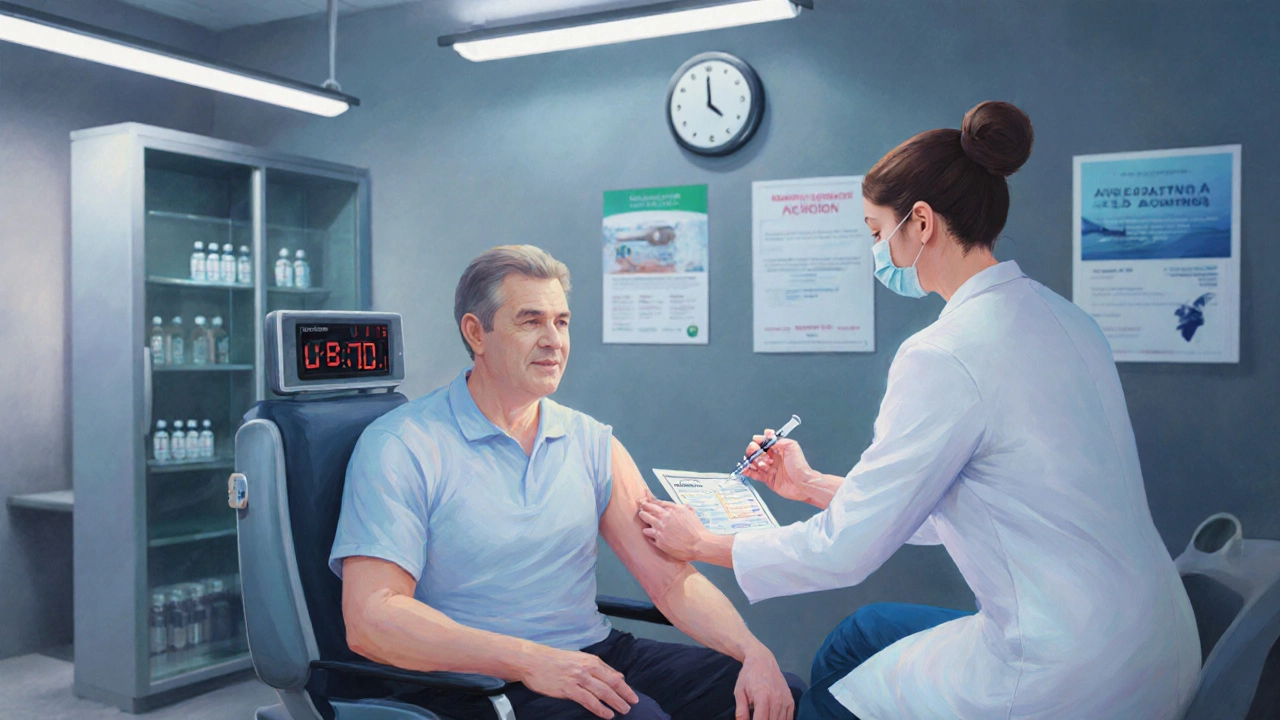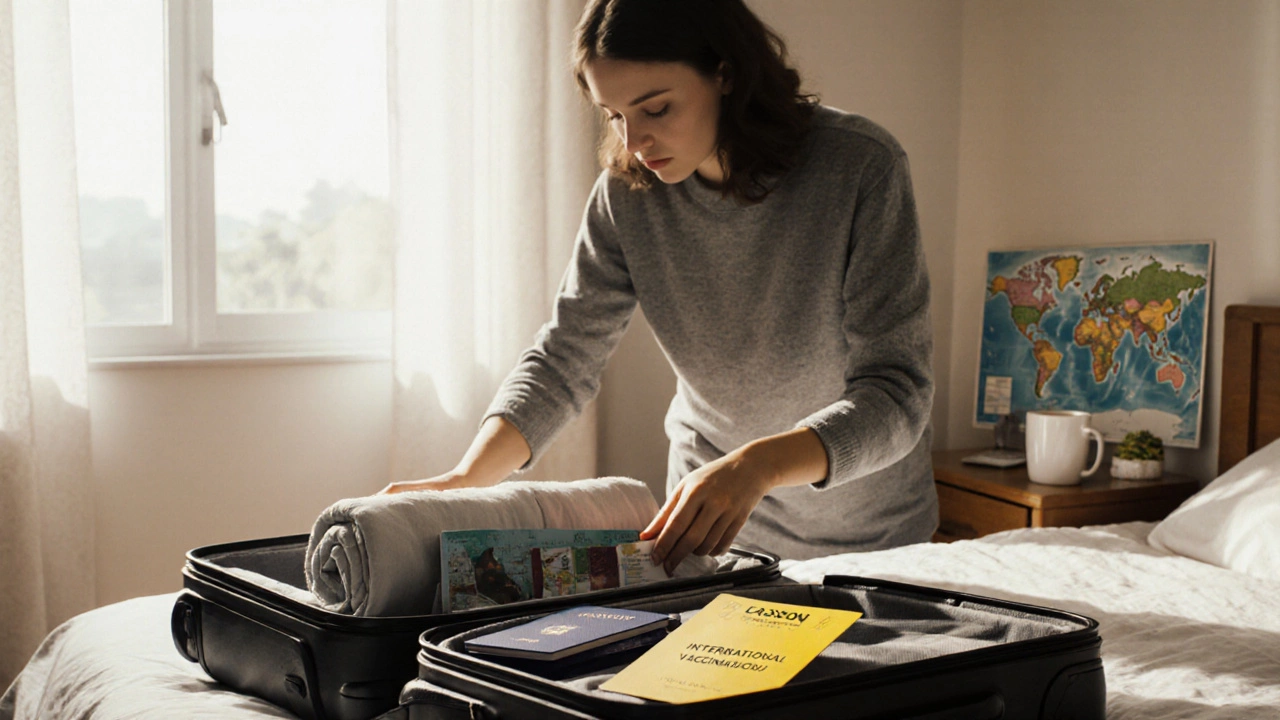India Vaccination Planner
Get Your Personalized Vaccine Plan
Answer a few questions about your trip to determine which vaccinations you need for India
Your Recommended Vaccinations
Required
Strongly Recommended
Important Notes
Quick Takeaways
- Yellow fever is mandatory only if you’re arriving from a risk country.
- Hepatitis A, Typhoid, and Tetanus‑diphtheria are strongly recommended for most travelers.
- Japanese encephalitis and Rabies are worth considering if you’ll spend time in rural or wildlife areas.
- Start your immunisation plan at least 6‑8weeks before departure.
- Visit a travel‑health clinic for personalized advice and keep vaccination certificates handy.
When planning a trip to India the subcontinent’s most visited destination, offering everything from Himalayan treks to tropical beaches, the first thing most travelers think about is a packing list. The reality‑check that often gets missed is the set of shots you need to stay healthy on the ground.
What the Indian Government Actually Requires
The Indian Ministry of Health does not impose a blanket vaccination mandate for incoming tourists. The only legally required proof is a yellow fever vaccination certificate if you’re traveling from a country where yellow fever is endemic (e.g., parts of Africa or South America). Border officials will ask to see the International Certificate of Vaccination (the “yellow card”) in that scenario. If you’re flying straight from NewZealand, the UnitedKingdom, the UnitedStates, or most other nations, you can walk through immigration without any vaccine paperwork.
Vaccines Most Travelers Should Consider
Even though India doesn’t force you to be inoculated, the disease landscape makes several shots a smart choice. Below is a practical breakdown that matches the risk level of typical itineraries.
| Vaccine | Needed for? | Typical Schedule | Primary Protection |
|---|---|---|---|
| Hepatitis A liver infection transmitted through contaminated food or water | Strongly recommended for all travelers | Single dose 2weeks before travel (booster at 1year if needed) | Prevents severe liver disease and jaundice |
| Typhoid bacterial infection spread via unsafe food and water | Strongly recommended for most itineraries | Oral series (4 capsules) or single injection 1week before travel | Reduces risk of high‑fever illness and intestinal perforation |
| Hepatitis B blood‑borne liver virus | Recommended for long stays, medical work, or sexual activity | Three‑dose series (0,1,6months) - start at least 1month before departure | Prevents chronic liver disease and liver cancer |
| Japanese Encephalitis (JE) mosquito‑borne brain infection | Important for rural NorthIndia, monsoon season, or wildlife safaris | Two doses, 1month apart; final dose at least 2weeks before travel | Prevents rare but often fatal encephalitis |
| Rabies viral disease from animal bites | Advised for trekking, wildlife encounters, or long rural stays | Three‑dose pre‑exposure schedule (days 0,7,21‑28) | Eliminates need for costly post‑exposure shots |
| Tetanus‑Diphtheria‑Pertussis (Tdap) protects against tetanus, diphtheria and whooping cough | Recommended for all travelers, especially if you’ll be outdoors | Booster every 10years; ensure one dose within 5years of travel | Prevents life‑threatening bacterial infections |
| COVID‑19 respiratory virus with evolving variants | Required by many airlines and hotels; advisable for any international travel | Complete primary series plus any recommended booster within 6months of travel | Reduces severe disease and hospitalization risk |
| Yellow Fever viral hemorrhagic disease transmitted by Aedes mosquitoes | Mandatory only if arriving from a yellow‑fever‑endemic country | Single dose at least 10days before entry | Meets Indian entry requirement; protects against severe fever |

When to Start Your Immunisation Plan
Timing matters. Some vaccines (like HepatitisA and Typhoid) need only a couple of weeks, while others (JE, Rabies, HepatitisB) require a multi‑dose schedule spanning months. Here’s a simplified timeline:
- 8‑10weeks before departure: Book an appointment at a travel‑health clinic. Discuss your itinerary, health history, and any medication you’re taking.
- 6weeks before: Get HepatitisA, Typhoid (injectable), Tdap, and start the HepatitisB series if you need it.
- 4weeks before: Receive the first dose of Japanese Encephalitis (if applicable) and the first Rabies shot (if you’ve opted for pre‑exposure).
- 2weeks before: Complete the second JE dose and second Rabies dose, and secure your Yellow Fever certificate if required.
- 1week before: Verify you have all vaccine cards, ensure your COVID‑19 booster is up to date, and pack the documentation in your carry‑on.
Most clinics can accelerate the schedule for a last‑minute traveler, but the immune response may not be as robust, so early planning is best.
Where to Get Your Shots
In NewZealand, the safest route is a dedicated travel‑health clinic such as the Travel Medicine Service part of the Ministry of Health’s vaccination program. These centres have up‑to‑date guidelines, can provide certified International Certificates, and often bundle vaccines at a reduced price.
If you’re already abroad, reputable private hospitals in major Indian cities (e.g., Apollo Hospitals in Delhi or Tata Memorial Hospital in Mumbai) offer the same vaccines, but you’ll need to bring your own medical records for reference.
Cost, Insurance, and Documentation Tips
- Budget: A full suite of recommended shots (Hep A, Typhoid, Tdap, JE, Rabies, Hep B) costs roughly NZ$350‑450 in NewZealand. Private hospitals in India charge about 30‑40% less, but you’ll need a follow‑up with a NewZealand doctor for the official certificate.
- Insurance: Check whether your travel insurance covers vaccine‑related visits. Some policies reimburse a portion of the cost if the vaccine is deemed medically necessary for the destination.
- Paperwork: Keep both the original International Certificate of Vaccination (the yellow card) and a digital scan in your email. Some airlines request a COVID‑19 proof at check‑in, so have that handy too.

Pre‑Travel Health Checklist
- Confirm which countries you’ll transit through - add Yellow Fever if needed.
- Map your itinerary: urban hubs (Delhi, Mumbai) vs. rural stays (Rajasthan, Assam) - decide on JE, Rabies.
- Schedule a travel‑medicine appointment at least 8weeks before departure.
- Bring a list of current medications and any allergies to the clinic.
- Obtain and store your vaccination certificates (physical + digital).
- Pack a basic medical kit - oral rehydration salts, antidiarrheal tablets, and a copy of your vaccine record.
What to Do If You Miss a Dose While On The Road
Accidents happen. If you realize you’re missing a second JE or Rabies dose during a multi‑week trek, head to the nearest reputable hospital or a government health centre. Most Indian hospitals keep a stock of travel vaccines, and the staff can complete the series on the spot. Keep a copy of the first dose certificate - it speeds up the process.
Frequently Asked Questions
Do I need a Yellow Fever vaccine if I’m flying directly from NewZealand?
No. India only requires a Yellow Fever certificate if you’re arriving from a country where the disease is endemic. Travellers from NewZealand, the UK, the US, Australia, etc., can enter without it.
Is the Typhoid vaccine mandatory for city tours like Delhi or Mumbai?
It’s not mandatory, but highly recommended. Even in big cities, street food and unfiltered water can expose you to Salmonella Typhi. The injectable single‑dose version is convenient and gives protection for up to 2years.
How long does the protection from the HepatitisA vaccine last?
A single dose provides immunity for at least 10years, and a booster after one year extends it essentially for life.
Can I get the Rabies vaccine after I’m already bitten?
Yes, but you’ll need a series of post‑exposure injections (four doses over 14days) plus the animal’s observation. Pre‑exposure vaccination simplifies the protocol to just two booster shots after a bite.
Do I need a flu shot before traveling to India in October?
While not required, a seasonal influenza vaccine is wise, especially if you’ll be in crowded transport hubs. The flu season in India runs roughly from June to October, so a late‑summer shot works well.
